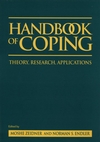|
Theory Research Applications

It has long been understood that how a person adjusts to life stresses is a major component of his or her ability to lead
a fulfilling life. Yet it wasn't until the 1960s that coping became a discrete topic of psychological inquiry. Since then,
coping has risen to a position of prominence in the modern psychological discourse—especially within the personality,
cognitive, and behavioral spheres—and, within the past decade alone, many important discoveries have been made about
its mechanisms and functioning, and its role in ongoing psychological and physical health and well-being.
A book whose time has come at last, the Handbook of Coping is the first professional reference devoted exclusively to the
psychology of coping. Reporting the observations and insights of nearly sixty leading authorities in stress and coping from
a wide range of affiliations and schools of thought, it brings readers the state of the art in coping theory, research, assessment,
and applications. In orchestrating the book, the editors have scrupulously avoided imposing any particular slant or point
of view, other than the need to foster greater eclecticism and cooperation between researchers and clinicians concerned with
the phenomenon of coping.
The Handbook of Coping is divided into five overlapping parts, the first of which serves to lay the conceptual foundations
of all that follows. It traces the history of coping from its origins in psychoanalytic theories of unconscious defense mechanisms,
and provides an exhaustive review of the latest conceptualizations, models, and constructs. The following section provides
an in-depth exploration of current research methodology, measurement, and assessment tools. Part Three explores key facets
of coping in a broad range of specific domains, including everyday hassles, chronic disease, cataclysmic events, and many
others. The penultimate section focuses on individual differences. Among important topics covered here are coping styles and
dispositions; the role of family, social support, and education; and coping behaviors across the life span. The final section,
Part Five, is devoted to current applications. Clinical parameters are defined and a number of specific interventions are
described, as are proven techniques for helping clients to improve their coping skills.
A comprehensive guide to contemporary coping theory, research, and applications, the Handbook of Coping is an indispensable
resource for practitioners, researchers, students, and educators in psychology, the health sciences, and epidemiology.
|
|
p.30 Coping processes are central to stress resistance... Resilience in the face of adversity involves
a dynamic interplay between personal and social resources and coping efforts
p.350-351 The term stressors will be used to refer to physical and social environmental conditions that
the average person would perceive as actually or potentially threatening, damaging, harmful, or depriving. Individuals' evaluation
of stressors are stress appraisals (Lazarus & Folkman, 1984). Biological responses to stressors are physiological
stress reactions... Coping responses and resources are intended to protect people from the negative effects
of stressors on psychological and physical health.
p.362 These theorists propose that adaptive costs are associated with coping processes used to remove
stressors or to ameliorate their negative biological, emotional, and psychological effects. Adaptive cost
theories have direct implications for coping with multiple stressors.
p.365 In some stressful situations, the stressor itself can interfere with a person's ability to
cope with another stressor by constraining behavioral options or limiting behavioral control. In such instances,
options for coping with a second stressor might be constrained. There is some evidence that constraints on coping
options might exacerbate the stress associated with multiple stressors.
p.365 The physiological and psychological changes caused by one stressor might
reduce a person's capacity to respond to another stressor... It is possible that people can suffer from residual
physical and cognitive fatigue as a result of effort expended in coping with a stressor. The fatigue associated with
coping with one stressor can degrade a person's ability to respond to the physical... or cognitive... demands required for
actively coping with stressors.
p.366 Physiological and cognitive fatigue have obvious implications for a person's ability to cope with
multiple stressors. Empirical evidence to date suggests that residual fatigue is most likely to occur following chronic
stressors and has the potential to interfere with a person's ability to actively cope with subsequent acute stressors
in a laboratory.
Resource Depletion
Residual fatigue and be conceived as a particular form of a more general cost of coping known as resource
depletion... Coping resources, however, do not just include biological resources; they include environmental and social resources...
If an individual depletes resources in coping with one stressor, he or she might be less resilient to subsequent stressors
than if the antecedent stressor had not occurred.
p.374 Two central challenges remain for researchers interested in the consequences of coping
with multiple stressors in the environment. First, there is scant data on basic parameters of multiple stressors
and coping transactions... Second, and more challenging, is the problem of specifying a theoretical model that can
explain the diverse effects of multiple stressors on human adaptation, which seem to include additive, potentiation
(cost of coping with more than one stressor), and attenuation (benefit of coping with more than one stressor) effects.
|
 |
|
|
 |
|
|
 |
|
|
|

